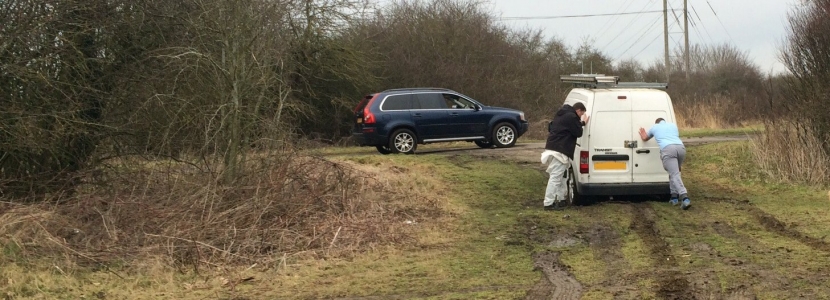
A fly-tipper who was caught after getting stuck in the mud has been ordered to pay £900 after admitting dumping hazardous waste.
Dean Paul Smith, 36, of Blackthorn Road, Didcot, appeared at Oxford Magistrates’ Court on Tuesday 19 September when he pleaded guilty to the charge of unlawfully depositing waste and failing to provide information as to who the driver of the vehicle from which the waste was deposited.
Magistrates heard how, on 6 February 2017, a member of the public contacted the police after seeing two men unloading waste from a vehicle on land off Mill Road in Abingdon. When the police arrived they found a significant amount of waste had been dumped and the two men were trying to move the vehicle which had got stuck in the mud as they attempted to leave the site. The pair claimed they had stopped at the site to eat lunch, during this time the vehicle got stuck and so they decided to remove the waste in order to lighten the load to help get it free.
The police asked the men to clear up the rubbish they had dumped however, due to the quantity involved, a lot of hazardous asbestos waste was left behind. As a result officers from Vale of White Horse District Council were asked to investigate the case.
Dean Smith, who was the passenger in the vehicle, was given a £400 fixed penalty notice for the offence, however he failed to pay this money and so council officers were left with little alternative but to prosecute the case in court. Despite being required to do so by law, Smith also declined to name the driver of vehicle.
In court Magistrates took Smith’s low income into account. This resulted in a fine of £270 for dumping the waste and £100 for failing to inform the district council who the driver of the vehicle was. He was also ordered to pay a £30 victim surcharge and £500 towards the costs of the prosecution.
Cllr Elaine Ware, Cabinet Member for Environmental Health at Vale of White Horse District Council, said: “Whatever the circumstances involved fly-tipping is always a real blight on society. It costs thousands in public money to clean up and investigate, and is potentially dangerous, especially if, like in this case, it is hazardous waste such as asbestos.”
